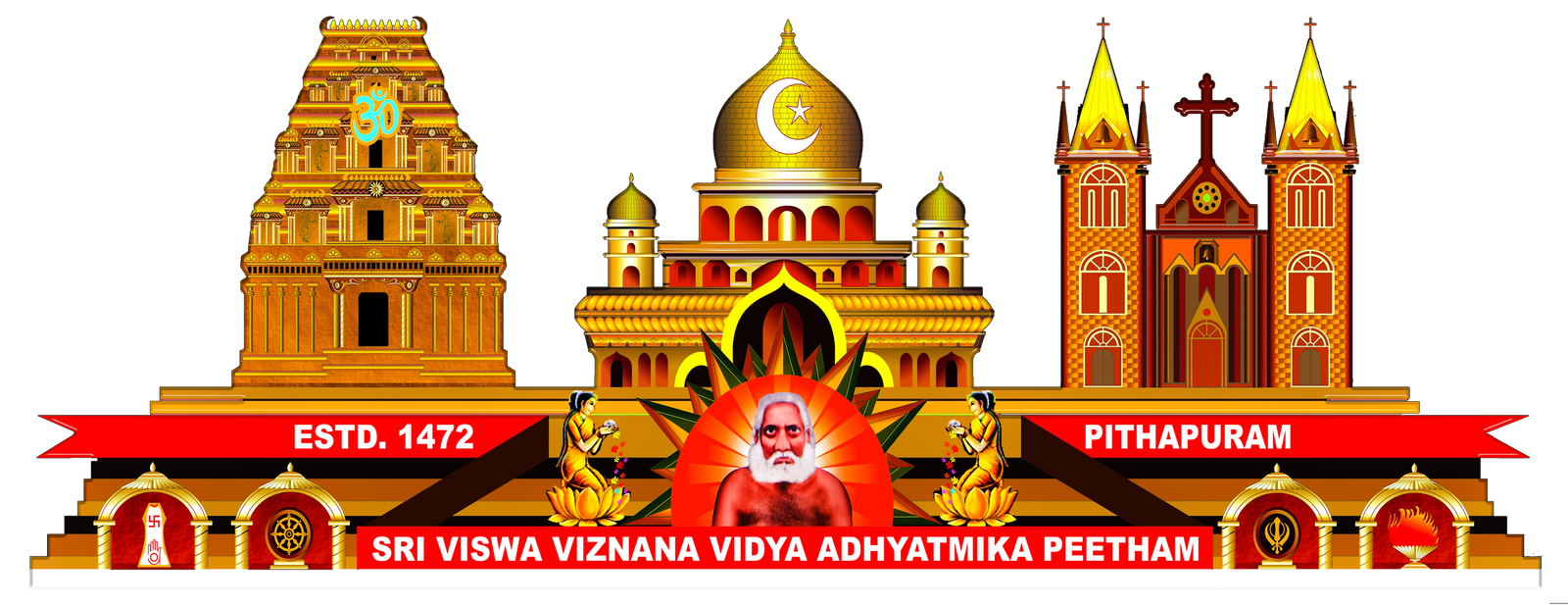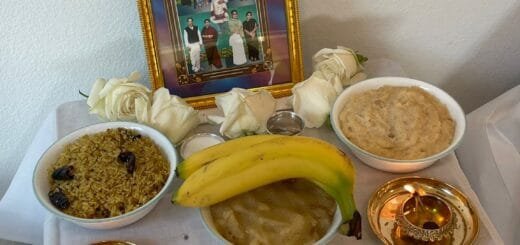Sha Philosophy – Chapter5: Sanctity
Sanctity is an extraordinary quality in the human point of view. But they are taking it lightly and dropping it. To define this “Sanctity” the word “purity” is used in this world. When “impurity” is expressed, to become pure, human beings take bath to clean the body physically. In addition to this, wherever they feel impure ( such as legs and other parts of the body), they clean with water. Then they will decide that they are pure. When auspicious or inauspicious ceremonies are performed, people bathe and feel satisfied.
To define this sanctity comprehensively in the name of purity, it is said; even the soul should also obtain purity by bathing in Jnanajala (water of knowledge), when such purity is attained, that person is treated as sanctified. The preceptors preach to their disciples that, the gross body can be purified by means of bath and the soul by means of Jnana (knowledge of performing one’s own role and activities in disciplined manner). That is, every action the disciple performs in the form of Karma (deeds), such as his expressions, actions and glances should be clean and pure as mentioned above.
In this context the preceptors preach to their disciples that,
- The disciple should acquire Vaksuddhi (purity in expression) by speaking only the truth but not the lies.
- When glances are in question, they should be without foulness. ( i.e without any ulterior motive)
- When the disciples perform their duties, their actions should be acceptable to the society.
- The disciples should always depict this purity in their behaviour and make it their way of life.
However, to discuss this “Sanctity” in theosophical terms, let us now keep aside these mundane procedures by which sanctity is defined with respect to gross body. Suppose a Sadhaka observes spiritual practice regularly by means of repeating Mahamantra ( mystic syllables) in his thoughts ( mind), and then the true nature of that Mahamantra is to awaken into Supreme Consciousness ( Cosmic Form Consists of Miraculous Brilliant Divine Light). That Mahamantra can certainly give salvation to that Sadhaka. When that Sadhaka advances in his spiritual practice, reaches towards its accomplishment by means of repeating such great Mahamantra, Branthi Sakti (the energy called delusion i.e. the power of illusion) will possess him. That Branthi Sakti can lead him into quiescent births. It tries to ruin the Sadhaka by diverting him from his spiritual path.
Charvakas1 , were such individuals as had changed their course in this manner. They left their spiritual practice. They became sceptic and materialistic. Their doctrine was,
- Man is indeed required to follow the ways and means by which he can derive pleasure
- Man need not discriminate between purity and impurity ( foul). He can act according to his wish.
- It is unnecessary to pursue that imperceptible divinity by observing the procedure of sanctity.
- It is desirable to enjoy every pleasure, a man can obtain. He need not bother whether it is pure or impure.
- This enjoyment of pleasure itself is the true nature of Brahman ( Soul/God). There is nothing more than this.
By spreading this doctrine the Charvakas endeavored to obtain this “pleasure” basing on their proverbial statement “Vidhi nishedhamuletiki pavitrudownedan, when I am ( the inner self/soul) pure, why to bother about regulations and prohibitions”. They have ratified this pleasure in sexual intercourse. To obtain this pleasure more and more, they required more strength. They studied the potencies and medicinal values of various herbs, fruits and minerals to enrich their strength. From these items the prepared stimulants and used them to arouse their sexual desire and gain strength. They derived this impure and momentary pleasure through sexual intercourse for sometime and were satisfied with it. But, during the course of time, their strength gradually diminished. Along with in their enjoyment pleasure also vanished. Ultimately the Charvaka creed itself perished.
However, based on the principle of this proverbial statement, “Vidhi nishedhamuletiki pavitrudownedan, when I am (inner/soul) pure, why to bother about regulations and prohibitions”, another creed known as “Achala Mata” has emerged. In literary sense “Achala” means rock. However they say it is “being stable” or reaching a state of absoluteness in bliss. This “Achala” creed abridged the above proverbial principle of Charvaka into their doctrine. The doctrine of “Achala” creed is,
- Soul is pure
- The soul is immune to the fruit of vile deeds performed by the gross body as Karma (action). Such vileness remains only with gross body.
- After death, this gross body burns into ash ( cremated), merges with five elements and the soul merges with space.
- The enjoyment derived through the experience of sensual pleasures is the real bliss. There is no other aim of this life.
- Reaching a stable state of ecstasy through sensual pleasures is known as Achala (stability) or the absoluteness in bliss.
This way, the preachers of the “Achala” creed preach and propagate the abominable and loathsome impurity as purity and prevail upon their followers. They ruin not only their births by falling into the vilest of the vilest pit of worldly pleasures, but also their follower’s births in the same manner. Ultimately they render their souls to reincarnate or transform into evil spirits or ghosts.
While a true philosopher awakens his disciples spiritual, he should know he has the responsibility to discriminate between Vidhi (Fate and Regulations) and Nishedha (Prohibitions). He should explain them in proper way to his disciples.
Vidhi (Fate): Fate is said to be the unexpected change of condition in circumstances, activities and affairs. This change is beyond any one’s imagination and intelligence. Man cannot justify this change, which he has obtained or witnessed, with his reasoning.
Vidhi ( Regulations): With respect to mundane aspects, regulations means,
- Accomplishment of justifiable and proper Vak (expressions).
- Performing the rightful activities or actions, those are compulsory and necessary.
Nishedha ( prohibitions): In this world, according to the culture of respective castes and creeds and religions, human beings have ratified certain regulations with respect to spiritual and mundane affairs. Contraventions of these regulations are termed as Nishedha ( Prohibitions).
Here are few examples. Muslims prohibit pork. Hindus prohibit beef. Vegetarians prohibit both. Those who live only on milk and fruits prohibit even the vegetarian food ( cooked vegetables etc) itself. Like this according to their religion, different actions are either regulated as “dos” or prohibited as “don’ts”. Therefore, one religious group prohibits the doctrine of actions of the other religious group. However, bring all the religious groups having different aspects of prohibitions in their doctrine of actions, on to a common platform and visualize. Then you can easily realize, the body features of all these people are similar, all of them are indeed human beings and trying to attain sanctity.
So, philosopher said,
Vidhiyu nishedhamul vidichipettitivela swatantra jeevita
pradita vilaasamul badaya vachchitivaa avi nishta kante na
thyadhikatarambu kashtamusumaa, apakeerthi sirana betti ee
prudhvini trunambu kante kadu heenuniga tala poyu nertuve.
Meaning: Why do you leave regulations and prohibitions! Indeed, these are very difficult to understand by enquiring into every aspect of them and follow. But, have you come in this world to obtain sensual pleasures and lead your life as libertine? Can you even bear the thought of leading such a mean life with ill fame like a worthless straw in this world!. Leading such a life is more difficult than austerity.
So, it means, it is very difficult to understand these regulations. It is still more difficult to examine and follow every regulation and prohibition. It is just impossible for any human being to follow them letter and spirit. Such a person, as endeavors to do so, can never advance even by single step in his course of life.
So, the man, as endeavors to obtain “sanctity”, through purity, should first understand these regulations ( Dos) and prohibitions ( Don’ts) in right perspective. For this, in his life ( i.e as way of his life) he should,
- Examine pros and cons of his actions, expressions and glances as and when he interacts with the society.
- Ascertain the result of his actions, expressions and glances to carry a positive impact on the society.
- Transform into Hamsa2 (divine soul or holy personality), which can differentiate the dos and don’ts and behave accordingly.
When such a person’s behaviour becomes a subject of conversation in the society, it should depict good. It should be ideal and exemplary. Those who talk about and listen to his behaviour should adopt him as their role model and lead their lives also in an exemplary manner. Such a person will never be subjected to any criticism of others. He will always prosper as man of “Sanctity” in the view of the society by being ideal.
Notes:
1. Charvakas: Followers of skeptical philosopher Charvaka, who has left Hindu creed.
2. Hamsa: Certain fabulous bird like swan. It is supposed to have the capability of separating milk from water and drink the milk only.
Another meaning of Hamsa is Divine soul or sage, who can differentiate the dos and don’ts and behave in a good way only.






